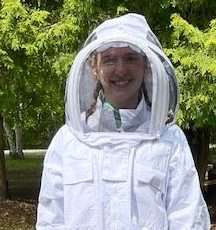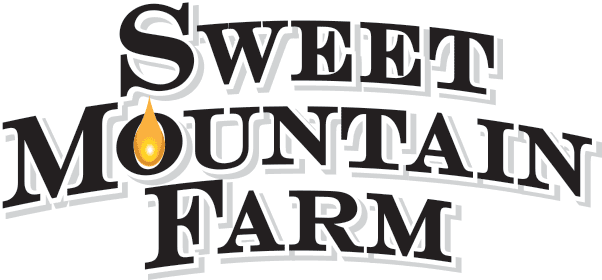
My name is Ana McCabe. Originally from Waseca, MN, I attend Augustana University in Sioux Falls, SD. I am a journalism and environmental studies major with an emphasis in agricultural sustainability. I am also minoring in American Sign Language. When I applied for various summer 2022 internships, I looked for an opportunity that would allow me to build my journalism skills and get my hands dirty working directly with sustainable food production and distribution methods. I did not intend to become an apiary intern with millions of small insects as my co-workers. I didn’t even know what an apiary was until the second week in June when I was introduced to Sue Dompke, founder and beekeeper at Sweet Mountain Farm, Washington Island, WI.
I applied to the Gathering Ground Summer 2022 Internship to learn more about food localism and distribution, efforts to decrease food insecurity, the cultural aspect of food, and how these topics affect agricultural sustainability. I had envisioned a summer working with livestock, vegetable, and fruit farmers to learn their perspectives of producing food on the island. I hoped to share these findings with the Sioux Falls community to help increase the connection between people and food as well as reduce the rates of food insecurity within the region.
According to the article “Reconnecting with our Food,” written by Mel Friedel (american-disconnect-from-food), “Only 2% of the country works in farming, so that leaves 98% of the country to find information about it out of their own volition… The amount of processing and travel that our food goes through before it gets to us also explains why we feel detached from it: it somehow just shows up in our grocery stores after flying sometimes thousands of miles from an unnamed farm across the country or world.”
When I was assigned to work at Sweet Mountain Farm as an apiary intern, my anticipation to learn more about agriculture sustainability seemed to dissipate. Everyone knows where honey comes from. This initial response showed me just how much I really know about agriculture sustainability.
My mindset began to shift as each day drew nearer to the start of the Gathering Ground internship. My dad is a hobby beekeeper so I believed that the knowledge I gained assisting my dad gave me a decent background in beekeeping.
On June 7th, I biked 3.7 miles from Greengate Farm’s quaint cabin, my summer home away from home, to Sweet Mountain Farm. From the moment Dompke began discussing the topic of bees, I could tell I had a lot to learn. Information buzzed around my head like bees around their hive. Phrases flew past, like how a colony is sometimes referred to as a collective mind. How the smell of bananas around a bee hive is a good indicator that the colony is agitated. How bee venom can be used for medicinal purposes, such as a form of Botox in facial creams. Burning lavender stalks inside a bee smoker can be used to anesthetize the bees better than burning wood pellets. Within the first hour at Sweet Mountain Farm I gathered more information about bees than I ever had known in my life.
How ignorant I was to assume that because I am not working directly in the dirt with vegetables I wouldn’t be able to learn about agricultural sustainability. In some ways, agricultural sustainability begins with bees.
The article “Agriculture and Bees: What Consumers Need to Know,” written by Maria Cannon for the University of Pennsylvania Morris Arboretum blog (303-agriculture-and-bees-what-consumers-need-to-know.html) states that, “over one-third of the food we eat relies on pollination by bees, either directly or indirectly. Many fruits, nuts, and vegetables require pollination by bees and other insects in order to yield fruit, and without pollinators these crops could all but disappear from grocery store shelves. All of this pollination adds up to a big price tag: Honey bees contribute $24 billion annually to U.S. agriculture.”
I am beginning to understand that the benefits of bees go beyond honey, wax, and the pollination of flowers.
I had not visualized my summer to be filled with the hum of bee hives and the white uniform of a beekeeper when I first submitted my application to Gathering Ground. However, I am looking forward to learning from expert beekeepers and millions of insects. A summer with the bees will lead to a summer of growth.

Ana McCabe is a student at Augustana University in Sioux Falls, SD. She is majoring in journalism and environmental studies with an emphasis in agricultural sustainability, and minoring in American Sign Language. McCabe is passionate about sharing lessons, ideas, and stories focused on the health of the environment and the impact of societal ecological footprints. McCabe also has a passion for sharing sustainable recipes and regularly posts on her food instagram: foodalicious_yum. Additional work and visual content can be found on her agricultural sustainability blog: https://anamccabe.wordpress.com/blog/

One Comment
Comments are closed.